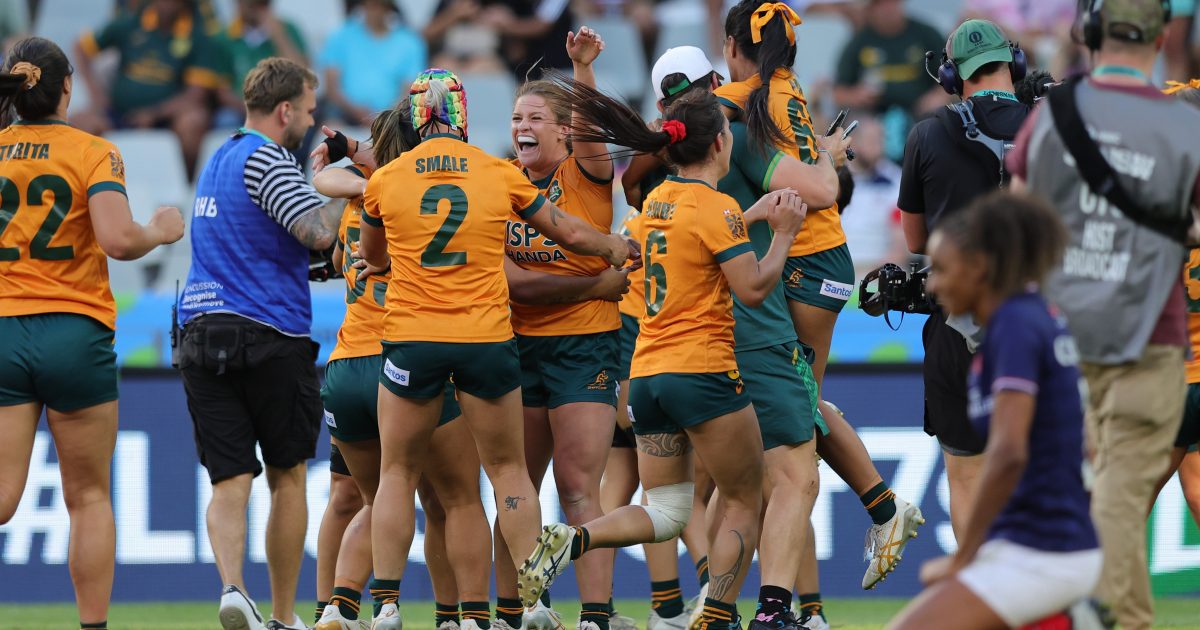La France s'incline en finale du HSBC SVNS Cape Town face à l'Australie

Lors d’une dernière journée riche en rebondissements au Cap, Michaela Blyde est devenue la deuxième joueuse dans l’histoire du rugby à sept à atteindre la barre des 200 essais. Une semaine après avoir vu leur série de 41 victoires stoppée par l’Australie à Dubaï, les Black Ferns Sevens ont été surclassées par la France en demi-finale au Cape Town Stadium.
La première personne à féliciter Michaela Blyde pour avoir franchi ce cap a été la première joueuse à atteindre ce chiffre, sa coéquipière Portia Woodman-Wickliffe.
L’Australie remporte un deuxième titre dans la douleur
La semaine dernière à Dubaï, l’Australie avait survécu trois minutes en demi-finale contre la France avec six joueuses sur le terrain suite au carton rouge d’Alysia Lefau-Fakaosilea. Au Cap, elles ont survécu à toute la deuxième mi-temps avec une joueuse en moins pour remporter le premier titre de leur histoire en Afrique du Sud au terme d’une finale spectaculaire qui s’est terminée sur le score de 29-26.
Levi a été exclu pour un plaquage haut à la fin d’une première période qui a duré trois minutes de plus que la normale. Les Australiennes menaient 22-0 dans les six premières minutes, avant que les Bleues n’inscrivent leur nom au tableau d’affichage.
Mais un doublé d’Anne-Cécile Ciofani dans la prolongation de la première mi-temps et un troisième essai signé Carla Neisen ont permis à la France de revenir à trois points. Kaitlin Shave a ensuite mis l’Australie en sécurité, tout comme Levi l’avait fait à Dubaï le dimanche précédent, malgré l’essai de Joanna Grisez en toute fin de rencontre.
La capitaine Charlotte Caslick a déclaré : « C’était un effort vraiment éprouvant, de terminer le match avec seulement six joueuses. Nous avons joué contre la France la semaine dernière et nous avons également reçu un carton rouge. Les filles ont fait preuve de beaucoup de courage en jouant comme ça deux semaines de suite.
« Nous adorons venir au Cap, alors gagner ici et enchaîner une deuxième victoire – ce que nous n’avions pas fait depuis très longtemps – c’est vraiment bien lancer notre saison. »
Caslick et Isabelle Nasser avaient déjà marqué deux fois en demi-finale, permettant à l’Australie de se qualifier pour la finale en s’imposant 33-5 face aux États-Unis, après avoir remporté un quinzième quart de finale en seize participations, grâce à sa 29e victoire consécutive sur l’Irlande (24-14).
La France a résisté à une féroce résistance de la Nouvelle-Zélande, marquant même un essai désespérément nécessaire alors qu’elle était réduite à six joueuses, pour remporter la troisième demi-finale de sevens de son histoire, en battant les Black Ferns 24 à 12.
Des essais d’Anne-Cécile Ciofani, Chloé Jacquet et Lili Dezou ont suffi à leur permettre d’atteindre le dernier carré, malgré un essai sur le tard de la Fidjienne Reapi Ulunisau, qui a ramené le score à 19-17 en quart de finale.
La Nouvelle-Zélande termine avec le bronze
Jorja Miller a aplati pour la deuxième fois au Cap et Blyde a ajouté un 201e essai à sa carrière. La Nouvelle-Zélande a battu les États-Unis 19-7 pour terminer le week-end à la troisième place.
Risi Pouri-Lane, qui a marqué le troisième essai de la rencontre, a commenté : « Nous étions venues ici pour gagner le tournoi, mais nous devons nous contenter de cette victoire. On sait qu’on a encore beaucoup à donner. La saison est encore longue, alors nous allons continuer à construire. »
Plus tôt, le 200e essai de Blyde sur le circuit mondial, qui avait permis à la Nouvelle-Zélande de battre le Canada 41-0, n’était pas son plus spectaculaire. Mais il a été pleinement mérité, puisqu’elle s’est frayé un chemin à travers deux plaqueuses jusqu’à la ligne.
« Il était normal que ce soit l’essai le plus difficile que j’aie jamais marqué dans ma vie et il fallait que ce soit le 200 », a souri Blyde à l’issue de la rencontre. « C’était un objectif que je m’étais fixé depuis un certain temps. Le prochain est d’être devant Portia, mais ça risque de prendre du temps, si elle ne prend pas sa retraite avant moi. »
Pendant ce temps, la capitaine des Etats-Unis, Naya Tapper, a marqué le premier et le dernier essai du quart de finale. Les Américaines ont assuré leur place dans le dernier carré en s’imposant 19-12 face à une Grande-Bretagne en net progrès.
Les Fidji s’emparent de la cinquième place à la dernière minute
Reapi Ulunisau s’est précipité pour marquer un essai à l’approche du coup de sifflet final. Les Fidji sont revenues au score pour battre le Canada – avec Olivia Apps expulsée pour un plaquage haut – 19-17 dans le match de barrage pour la cinquième place.
L’Irlande a terminé septième, après avoir battu la Grande-Bretagne 17-5.
L’essai de Marina Fioravanta a permis au Brésil de terminer le tournoi du Cap à la neuvième place, après être revenu au score pour battre le Japon 15-14 sous le soleil de l’après-midi.
L’Afrique du Sud, victime de blessures, termine à la dernière place du classement, bien qu’elle ait pris l’avantage au début de son match contre l’Espagne. Mais l’essai transformé d’Ayanda Malinga en début de rencontre a été le seul point fort de la défaite 21-7 du pays hôte, qui avait débuté sa journée par une défaite 27-7 contre le Japon.
Le HSBC SVNS 2024 sera de retour à la fin du mois de janvier à Perth.
LE CLASSEMENT DU HSBC SVNS CAPE TOWN
- Australie
- France
- Nouvelle-Zélande
- Etats-Unis
- Fidji
- Canada
- Irlande
- Grande-Bretagne
- Brésil
- Japon
- Espagne
- Afrique du Sud


